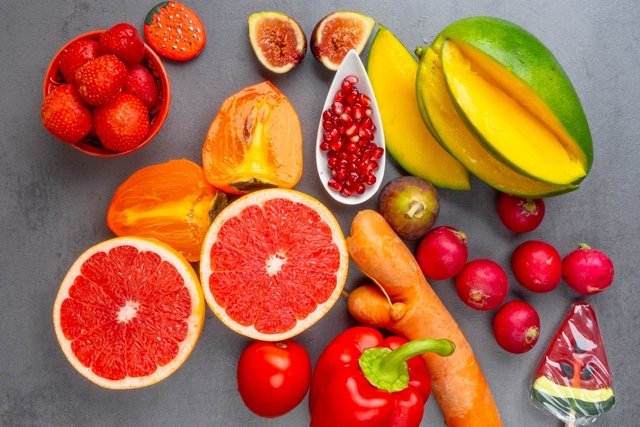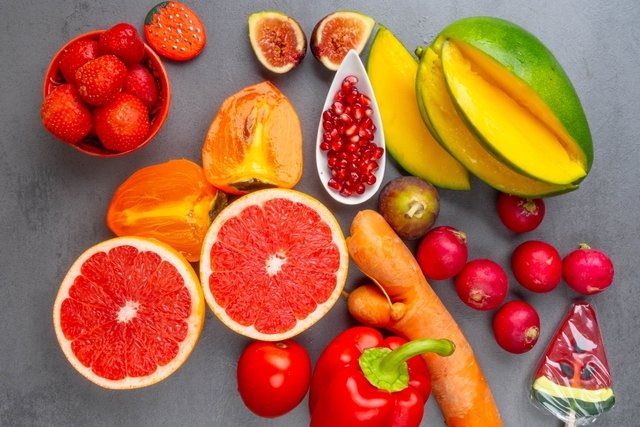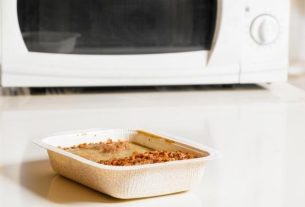Foods rich in beta-carotene are fruits, vegetables and whole grains, such as carrots, apricots, peaches and dark leafy vegetables, such as spinach and broccoli.
Beta-carotene is a yellow, orange or reddish pigment that belongs to the group of carotenoids, serving to prevent the onset of heart disease, vision problems and cancer. Furthermore, it also promotes tanning of the skin when consumed a few days before going to the beach.
The benefits of foods rich in beta-carotene are due to the fact that this carotenoid has great antioxidant power, so the body metabolizes it and converts it into vitamin A, protecting the body’s cells from damage caused by free radicals.

List of foods rich in beta-carotene
The following table shows the main foods rich in beta-carotene per 100 grams of food:
Consuming 3 to 5 servings per day of vegetables and fruits that contain beta-carotene provides, on average, 6 to 8 mg of beta-carotene, which is enough to obtain all the benefits.
See, in the following video, a recipe rich in foods with beta-carotene:
Main benefits
The main benefits of foods rich in beta-carotene are:
1. Protect the first
Beta-carotene helps protect the skin from sunburn, prevents premature skin aging, wrinkle formation and skin cancer. This is mainly due to its antioxidant properties, which help prevent free radical damage to skin cells due to oxidative stress.
2. Take care of visual health
As it is a precursor of vitamin A, consuming foods rich in beta-carotene helps to maintain vision health, as it promotes the production of various pigments in the retina that help with night vision and the capture of light by the eyes. Furthermore, it helps prevent macular degeneration, which is an age-related disease, as well as cataracts and night blindness.
3. Helps prevent cancer
Some studies indicate that regular intake of foods rich in beta-carotene could help prevent some types of cancer, such as lung cancer, skin cancer, mouth cancer and neuroblastoma, as due to its high antioxidant action it prevents damage caused by free radicals. cells, inhibiting the growth of tumor cells.
4. Promotes tanning
Foods rich in beta-carotene help the skin tan more quickly, as it contributes to the production of melanin, which is responsible for giving the skin its color. To feel the effect of beta-carotene on your tan, it is recommended to consume these foods 2 to 3 times a day, for at least 7 days before your first sun exposure.
5. Reduces the risk of respiratory diseases
Consuming foods rich in beta-carotene could help prevent respiratory diseases, such as chronic obstructive pulmonary disease (COPD), asthma, acute lung injury, acute respiratory distress syndrome and lung cancer, as it has anti-inflammatory and antioxidant properties, in addition to to help improve lung function.
6. Helps in the treatment of erythropoietic protoporphyria
Beta-carotene is part of the treatment for people who have erythropoietic protoporphyria, an uncommon hereditary disease in which exposure to sunlight can cause damage to the skin, as there is greater sensitivity to sunlight.
The consumption of large amounts of beta-carotene by people with this disease causes sensitivity to the sun to progressively decrease. However, the doctor may reduce the dose as sensitivity improves.
7. Take care of heart health
Consuming beta-carotene helps reduce the risk of heart disease, as carotenoids could protect blood vessels and thus prevent heart attacks. Furthermore, beta-carotene may be able to reduce levels of homocysteine, an amino acid present in blood plasma linked to the development of diseases such as stroke, coronary disease and heart attack.
Beta-carotene supplement
In addition to being present in food, beta-carotene can be consumed as a nutritional supplement in capsule form, and can be found in pharmacies, health food stores or online, and it is important that it is only consumed under the guidance of a doctor or nutritionist.
In general, the dose of beta-carotene for adults is 6 to 15 mg per day. In the case of people with erythropoietic protoporphyria, the dose can vary between 30 and 300 mg of beta-carotene per day.
Excess beta-carotene
When beta-carotene is consumed in excess, both in capsules and in food, it can cause a condition known as carotenemia, which can cause the skin to have a yellowish or orange color. This condition can be reversed by reducing consumption or completely avoiding the consumption of foods rich in this carotenoid.

Sign up for our newsletter and stay up to date with exclusive news
that can transform your routine!
Warning: Undefined array key "title" in /home/storelat/public_html/wp-content/plugins/link-whisper-premium/templates/frontend/related-posts.php on line 12
Warning: Undefined array key "title_tag" in /home/storelat/public_html/wp-content/plugins/link-whisper-premium/templates/frontend/related-posts.php on line 13




